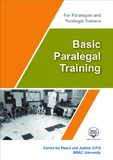Basic Paralegal Training
Abstract
The module has been developed to build up a group of paralegals with basic paralegal skills,
knowledge and mindset.
The subjects, content and presentation of the module were chosen with the aim of developing a
module that would be beneficial for both paralegals and paralegal trainers.
The module has been finalized after a lengthy process of feedback and deliberations from the
stakeholders. Following multiple meetings, discussions and workshops organized in collaboration
with leading legal empowerment throughout 2015 and 2016, a decision was taken to design, develop
and implement a course on paralegal training. The initiative was undertaken by South Asian Institute
of Advanced Legal and Human Rights Studies (SAILS) under the aegis of BRAC University and
received financial support from the Open Society Foundation.
Subsequently, in June of 2016, with the help of 8(eight) trainers and lawyers from Ain O Shalish
Kendra (ASK), Madaripur Legal Aid Association (M.L.A.A), Citizen's Initiative, and the Council of
Minorities, a workshop was organized to start the development of this module. A 5-day residential
workshop was run and aided by NRT and the subject matter of the course, its study materials and
presentation methods were derived from this workshop. A compilation of these formed the first draft
of the module.
Subsequently following some changes and adjustments to the initial draft of the module, the usable
version was developed. None of the subject matters which had arisen during the workshop were
discarded during the revamping of the module. Keeping in mind various factors like class, elderly
education policy, material benefits, etc. of potential participants, some of the subject matter/content
has been broken down into multiple sections. Accordingly the logistics, stationaries, items, method of
presentation and the content of the course has been re-evaluated. The module has been divided
under 6 headings with 6 sections each for an easier learning experience. For every Chapter, there will
be more than 2 sessions and each session's title, purpose, time, method, ingredients, items, text
books, advice for the trainer, the aspects of the topic to be discussed and the procedures to conduct
the session have been described step by step. Furthermore, the effectiveness of the curriculum was
tested at field level; with the scope of experts of the field in the national level to examine it and give
their valuable feedback. The result from the field test as well as the feedback from the experts has
culminated in the current form of the module.
Considering the possibility of the training being imparted not only across the cities but also in remote
areas of the country, due consideration has been given to the method, material and items to be used
for the training so that every training centre with minimum facilities can be utilized.
Taking the subject matter as well as the sessions' requirement into consideration the timeframe for
the course ought to have been at least 7(seven) days. A timeframe of 9 (nine) days would have
allowed for more practice exercises. After much deliberation regarding the participants and their
respective organizations, the time the trainers are prepared to give, the budget and other aspects the
course, the duration of the course was agreed at 6 (six) days. The daily itinerary therefore may
appear constricted. However, the trainers as well as the administrators, upon discussion, are at
liberty to reduce some of the sessions from the modules if they deemed necessary. If one can
continue promising participants, trainers, managers/administrators, and other facilities, the
endeavor shall bear fruits, even though the process may demand hard work.
Type
Training moduleCollections
- Training Module [1]

